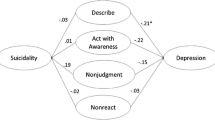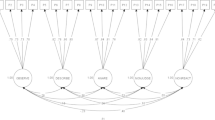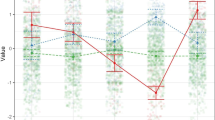Abstract
Objectives
Black Americans disproportionately experience higher levels of chronic stress. Mindfulness is a promising, cost-effective option for reducing stress and related mental health outcomes, such as depression and anxiety. The Five Facet Mindfulness Questionnaire (FFMQ) is one of the most widely used tools to measure mindfulness; however, Black American samples have been underrepresented in validation studies of the FFMQ. Consequently, the validity of the FFMQ within Black Americans has received minimal attention. The present study assessed the psychometric properties and nomological network of the original 39-item FFMQ (FFMQ-39) and the short form 15-item FFMQ (FFMQ-15) among a non-clinical, Black American sample in the United States.
Method
In a longitudinal study, 586 Black Americans completed either the FFMQ-39 or the FFMQ-15 at two time points one month apart, as well as measures of the constructs in mindfulness’ nomological network and demographic attributes.
Results
Exploratory and confirmatory factor analyses supported a 5-factor structure in both questionnaires. Both questionnaires had good fit indices (RMSEA < 0.06, SRMR < 0.08, CFI > 0.92, TFI > 0.92) and demonstrated strong test–retest reliability, expected associations with nomological network variables, and invariance across ethnic heritage, ethnic identity, everyday discrimination, lifetime discrimination, skin tone, depression level, gender, mindfulness meditation experience, and household income.
Conclusions
The results indicate that both the FFMQ-39 and the FFMQ-15 can validly and reliably measure mindfulness in a non-clinical, Black American sample. These findings contribute to cultural generalizability and mindfulness assessment within underrepresented populations.
Preregistration
The analytic plan was pre-registered on the Open Science Framework. Registration: https://osf.io/95v4m
Similar content being viewed by others
Data Availability
De-identified data is available at https://osf.io/jq3ys/?view_only=f4b60658da0b4f05850f1383da5b1da9
References
Adewale, V., Ritchie, D., & Skeels, S. E. (2016). African-American and African perspectives on mental health: A pilot study of the pre and post colonial and slavery influences and their implications on mental health. Journal of Communication in Healthcare, 9(2), 78–89. https://doi.org/10.1080/17538068.2016.1170316
Aichholzer, J. (2014). Random intercept EFA of personality scales. Journal of Research in Personality, 53, 1–4. https://doi.org/10.1016/j.jrp.2014.07.001
Baer, R. A., Carmody, J., & Hunsinger, M. (2012). Weekly change in mindfulness and perceived stress in a Mindfulness-Based Stress Reduction Program. Journal of Clinical Psychology, 68(7), 755–765. https://doi.org/10.1002/jclp.21865
Baer, R. A., Samuel, D. B., & Lykins, E. L. B. (2011). Differential item functioning on the Five Facet Mindfulness Questionnaire is minimal in demographically matched meditators and nonmeditators. Assessment, 18(1), 3–10. https://doi.org/10.1177/1073191110392498
Baer, R. A., Smith, G. T., & Allen, K. B. (2004). Assessment of mindfulness by self-report: The Kentucky Inventory of Mindfulness Skills. Assessment, 11(3), 191–206. https://doi.org/10.1177/1073191104268029
Baer, R. A., Smith, G. T., Hopkins, J., Krietemeyer, J., & Toney, L. (2006). Using self-report assessment methods to explore facets of mindfulness. Assessment, 13(1), 27–45. https://doi.org/10.1177/1073191105283504
Baer, R. A., Smith, G. T., Lykins, E., Button, D., Krietemeyer, J., Sauer, S., Walsh, E., Duggan, D., & Williams, J. M. G. (2008). Construct validity of the Five Facet Mindfulness Questionnaire in meditating and nonmeditating samples. Assessment, 15(3), 329–342. https://doi.org/10.1177/1073191107313003
Beck, A. T., Steer, R. A., & Brown, G. (1996). Beck Depression Inventory–II (BDI-II) [Database record]. APA PsycTests. https://doi.org/10.1037/t00742-000
Biggers, A., Spears, C. A., Sanders, K., Ong, J., Sharp, L. K., & Gerber, B. S. (2020). Promoting mindfulness in African American communities. Mindfulness, 11(10), 2274–2282. https://doi.org/10.1007/s12671-020-01480-w
Blanke, E. S., Schmidt, M. J., Riediger, M., & Brose, A. (2020). Thinking mindfully: How mindfulness relates to rumination and reflection in daily life. Emotion, 20(8), 1369–1381. https://doi.org/10.1037/emo0000659
Bodhi, B. (2011). What does mindfulness really mean? A canonical perspective. Contemporary Buddhism, 12(1), 19–39. https://doi.org/10.1080/14639947.2011.564813
Bond, S., & Cash, T. F. (1992). Black beauty: Skin color and body images among African-American college women. Journal of Applied Social Psychology, 22(11), 874–888. https://doi.org/10.1111/j.1559-1816.1992.tb00930.x
Browne, M. W., & Cudeck, R. (1992). Alternative ways of assessing model fit. Sociological Methods & Research, 21(2), 230–258. https://doi.org/10.1177/0049124192021002005
Buchanan, N. T., Perez, M., Prinstein, M. J., & Thurston, I. B. (2021). Upending racism in psychological science: Strategies to change how science is conducted, reported, reviewed, and disseminated. American Psychologist, 76(7), 1097–1112. https://doi.org/10.1037/amp0000905
Carmody, J., & Baer, R. A. (2008). Relationships between mindfulness practice and levels of mindfulness, medical and psychological symptoms and well-being in a mindfulness-based stress reduction program. Journal of Behavioral Medicine, 31(1), 23–33. https://doi.org/10.1007/s10865-007-9130-7
Chiesa, A., & Serretti, A. (2009). Mindfulness-Based Stress Reduction for stress management in healthy people: A review and meta-analysis. The Journal of Alternative and Complementary Medicine, 15(5), 593–600. https://doi.org/10.1089/acm.2008.0495
Christopher, M. S., Neuser, N. J., Michael, P. G., & Baitmangalkar, A. (2012). Exploring the psychometric properties of the Five Facet Mindfulness Questionnaire. Mindfulness, 3(2), 124–131. https://doi.org/10.1007/s12671-011-0086-x
DeLuca, S. M., Kelman, A. R., & Waelde, L. C. (2018). A systematic review of ethnoracial representation and cultural adaptation of mindfulness- and meditation-based interventions. Psychological Studies, 63(2), 117–129. https://doi.org/10.1007/s12646-018-0452-z
Diener, E., Emmons, R. A., Larsen, R. J., & Griffin, S. (1985). The Satisfaction with Life Scale. Journal of Personality Assessment, 49(1), 71–75. https://doi.org/10.1207/s15327752jpa4901_13
Dutton, G. R., Grothe, K. B., Jones, G. N., Whitehead, D., Kendra, K., & Brantley, P. J. (2004). Use of the Beck Depression Inventory-II with African American primary care patients. General Hospital Psychiatry, 26(6), 437–442. https://doi.org/10.1016/j.genhosppsych.2004.06.002
Gu, J., Strauss, C., Crane, C., Barnhofer, T., Karl, A., Cavanagh, K., & Kuyken, W. (2016). Examining the factor structure of the 39-item and 15-item versions of the Five Facet Mindfulness Questionnaire before and after mindfulness-based cognitive therapy for people with recurrent depression. Psychological Assessment, 28(7), 791–802. https://doi.org/10.1037/pas0000263
Hirschfeld, G., & Brachel, R. (2014). Multiple-group confirmatory factor analysis in R – A tutorial in measurement invariance with continuous and ordinal indicators. Practical Assessment Research and Evaluation, 19, 1–12. https://doi.org/10.7275/qazy-2946
Hu, L., & Bentler, P. M. (1999). Cutoff criteria for fit indexes in covariance structure analysis: Conventional criteria versus new alternatives. Structural Equation Modeling, 6(1), 1–55. https://doi.org/10.1080/10705519909540118
Johnson, C. C., Sheffield, K. M., & Brown, R. E. (2018). Mind-body therapies for African American women at risk for cardiometabolic disease: A systematic review. Evidence Based Complementary and Alternative Medicine, 2018, 5123217. https://doi.org/10.1155/2018/5123217
Karl, J. A., Prado, S. M. M., Gračanin, A., Verhaeghen, P., Ramos, A., Mandal, S. P., Michalak, J., Zhang, C.-Q., Schmidt, C., Tran, U. S., Druica, E., Solem, S., Astani, A., Liu, X., Luciano, J. V., Tkalčić, M., Lilja, J. L., Dundas, I., Wong, S. Y. S., & Fischer, R. (2020). The cross-cultural validity of the Five-Facet Mindfulness Questionnaire across 16 countries. Mindfulness, 11(5), 1226–1237. https://doi.org/10.1007/s12671-020-01333-6
Kessler, R. C., Mickelson, K. D., & Williams, D. R. (1999). The prevalence, distribution, and mental health correlates of perceived discrimination in the United States. Journal of Health and Social Behavior, 40(3), 208–230. https://doi.org/10.2307/2676349
Lee, F. K., & Zelman, D. C. (2019). Boredom proneness as a predictor of depression, anxiety and stress: The moderating effects of dispositional mindfulness. Personality and Individual Differences, 146, 68–75. https://doi.org/10.1016/j.paid.2019.04.001
Lewis, T. T., Aiello, A. E., Leurgans, S., Kelly, J., & Barnes, L. L. (2010). Self-reported experiences of everyday discrimination are associated with elevated C-reactive protein levels in older African-American adults. Brain, Behavior, and Immunity, 24(3), 438–443. https://doi.org/10.1016/j.bbi.2009.11.011
Monk, E. P., Jr. (2022). Inequality without groups: Contemporary theories of categories, intersectional typicality, and the disaggregation of difference. Sociological Theory, 40(1), 3–27. https://doi.org/10.1177/07352751221076863
Neff, K. D. (2003). The development and validation of a scale to measure self-compassion. Self and Identity, 2(3), 223–250. https://doi.org/10.1080/15298860309027
Palta, P., Page, G., Piferi, R. L., Gill, J. M., Hayat, M. J., Connolly, A. B., & Szanton, S. L. (2012). Evaluation of a mindfulness-based intervention program to decrease blood pressure in low-income African-American older adults. Journal of Urban Health, 89(2), 308–316. https://doi.org/10.1007/s11524-011-9654-6
Oh, H., Lincoln, K., & Waldman, K. (2021). Perceived colorism and lifetime psychiatric disorders among Black American adults: Findings from the National Survey of American Life. Social Psychiatry and Psychiatric Epidemiology, 56(8), 1509–1512. https://doi.org/10.1007/s00127-021-02102-z
R Core Team. (2020). R: A language and environment for statistical computing. R Foundation for Statistical Computing Vienna Austria. http://www.R-project.org/
Revelle, W. (2021). Psych: Procedures for personality and psychological research (Version 2.2.5). Northwestern University. http://CRAN.R-project.org/package=psych
Raes, F., Pommier, E., Neff, K. D., & Van Gucht, D. (2011). Construction and factorial validation of a short form of the Self-Compassion Scale. Clinical Psychology & Psychotherapy, 18(3), 250–255. https://doi.org/10.1002/cpp.702
Roberts, R. E., Phinney, J. S., Masse, L. C., Chen, Y. R., Roberts, C. R., & Romero, A. (1999). The structure of ethnic identity of young adolescents from diverse ethnocultural groups. The Journal of Early Adolescence, 19(3), 301–322. https://doi.org/10.1177/0272431699019003001
Rogge, R. D., & Daks, J. S. (2021). Embracing the intricacies of the path toward mindfulness: Broadening our conceptualization of the process of cultivating mindfulness in day-to-day life by developing the unified Flexibility and Mindfulness Model. Mindfulness, 12(3), 701–721. https://doi.org/10.1007/s12671-020-01537-w
Rosseel, Y. (2012). lavaan: An R package for structural equation modeling. Journal of Statistical Software, 48(2), 1–36. http://www.jstatsoft.org/v48/i02/.
Ryff, C. D., Lee, C., & Keyes, M. (1995). The structure of psychological well-being revisited. Journal of Personality & Social Psychology, 69(4), 719–727. https://doi.org/10.1037/0022-3514.69.4.719
Schermelleh-Engel, K., Moosbrugger, H., & Müller, H. (2003). Evaluating the fit of structural equation models: Tests of significance and descriptive goodness of fit measures. Methods of Psychological Research Online, 8(2), 23–74. https://www.stats.ox.ac.uk/~snijders/mpr_Schermelleh.pdf.
Schussler, D. L., Harris, A. R., & Greenberg, M. T. (2020). A qualitative investigation of a mindfulness-based yoga program for educators: How program attendance relates to outcomes. Psychology in the Schools, 57(7), 1077–1096. https://doi.org/10.1002/pits.22374
Svendsen, J. L., Kvernenes, K. V., Wiker, A. S., & Dundas, I. (2017). Mechanisms of mindfulness: Rumination and self-compassion. Nordic Psychology, 69(2), 71–82. https://doi.org/10.1080/19012276.2016.1171730
Sweeney, T., Morriss, R., Nixon, E., Guo, B., & Callaghan, P. (2021). Psychometric properties of the Five Facets Mindfulness Questionnaire in moderate-to-severe, persistent depression. Mindfulness, 12(4), 1009–1021. https://doi.org/10.1007/s12671-020-01573-6
Tanaka, J. S. (1987). “How big is big enough?”: Sample size and goodness of fit in structural equation models with latent variables. Child Development, 58(1), 134–146. https://doi.org/10.2307/1130296
Tovar-Murray, D. (2011). The multiple determinants of religious behaviors and spiritual beliefs on well-being. Journal of Spirituality in Mental Health, 13(3), 182–192. https://doi.org/10.1080/19349637.2011.593405
Trapnell, P., & Campbell, J. (1999). Private self-consciousness and the five-factor model of personality: Distinguishing rumination from reflection. Journal of Personality and Social Psychology, 76(2), 284–304. https://doi.org/10.1037//0022-3514.76.2.284
Upchurch, D. M., & Johnson, P. J. (2019). Gender differences in prevalence, patterns, purposes, and perceived benefits of meditation practices in the United States. Journal of Women’s Health, 28(2), 135–142. https://doi.org/10.1089/jwh.2018.7178
Watson, N. N., Black, A. R., & Hunter, C. D. (2016). African American women’s perceptions of mindfulness meditation training and gendered race-related stress. Mindfulness, 7(5), 1034–1043. https://doi.org/10.1007/s12671-016-0539-3
Watson-Singleton, N. N., Pennefather, J., & Trusty, T. (2021). Can a culturally-responsive mobile health (mHealth) application reduce African Americans’ stress?: A pilot feasibility study. Current Psychology. https://doi.org/10.1007/s12144-021-01534-9
Watson-Singleton, N. N., Walker, J. H., LoParo, D., Mack, S. A., & Kaslow, N. J. (2018). Psychometric evaluation of the Five Facet Mindfulness Questionnaire in a clinical sample of African Americans. Mindfulness, 9(1), 312–324. https://doi.org/10.1007/s12144-021-01534-9
Webb, C. A., Beard, C., Forgeard, M., & Björgvinsson, T. (2019). Facets of mindfulness predict depressive and anxiety symptom improvement above CBT skills. Mindfulness, 10(3), 559–570. https://doi.org/10.1007/s12671-018-1005-1
Williams, D. R., Yu, Y., Jackson, J. S., & Anderson, N. B. (1997). Racial differences in physical and mental health: Socio-economic status, stress and discrimination. Journal of Health Psychology, 2(3), 335–351. https://doi.org/10.1177/135910539700200305
Womack, V. Y., & Sloan, L. R. (2017). The association of mindfulness and racial socialization messages on approach-oriented coping strategies among African Americans. Journal of Black Studies, 48(4), 408–426. https://doi.org/10.1177/0021934717696789
Zhang, H., Dong, L., Watson-Singleton, N. N., Tarantino, N., Carr, E. R., Niles-Carnes, L. V., Patterson, B., & Kaslow, N. J. (2019). Psychometric properties of the Self-Compassion Scale (SCS) in an African American clinical sample. Mindfulness, 10(7), 1395–1405. https://doi.org/10.1007/s12671-019-01099-6
Zhang, H., & Emory, E. K. (2015). A mindfulness-based intervention for pregnant African-American women. Mindfulness, 6(3), 663–674. https://doi.org/10.1007/s12671-014-0304-4
Zigmond, A. S., & Snaith, R. P. (1983). The Hospital Anxiety and Depression Scale. Acta Psychiatrica Scandinavica, 67(6), 361–370. https://doi.org/10.1111/j.1600-0447.1983.tb09716.x
Funding
This research was funded by a University of Toronto (UTSC) Research Competitiveness Grant awarded to B.Q.F. and A.J.S. G.N.O. was funded by a Ford Foundation Predoctoral Fellowship. S.A. was funded by NSF Graduate Research Fellowship (DGE 1752814), grants from the National Institute on Aging (R01-AG018436, R01-AG067622, and R01-AG064006), and the Claude D. Pepper Older Americans Independence Center (OAIC) at Northwestern University (P30AG059988). A.J.S. was supported by a National Center for Complementary and Integrative Health Grant, K23AT009208 as well as Mind and Life Varela Grant.
Author information
Authors and Affiliations
Contributions
G.N.O.: methodology, validation, formal analysis, investigation, data curation, writing—original draft, writing—review and editing, visualization, project administration. B.Q.F.: conceptualization, investigation, resources, project administration, writing—review and editing, supervision, funding acquisition. S.A.: methodology, validation, writing—review and editing. A.M.R.: investigation, writing—review and editing. S.L.: investigation, writing—review and editing. A.J.S.: conceptualization, investigation, resources, project administration, writing—review and editing, supervision, funding acquisition.
Corresponding author
Ethics declarations
Ethics Approval
The study received ethics approval from the Internal Review Board at the University of Toronto.
Informed Consent
Participants read information about the study and the study’s participation. Participants who agreed to participate provided informed consent via an online consent form.
Conflict of Interest
The authors declare no competing interests.
Additional information
Publisher's Note
Springer Nature remains neutral with regard to jurisdictional claims in published maps and institutional affiliations.
Supplementary Information
Below is the link to the electronic supplementary material.
Rights and permissions
Springer Nature or its licensor (e.g. a society or other partner) holds exclusive rights to this article under a publishing agreement with the author(s) or other rightsholder(s); author self-archiving of the accepted manuscript version of this article is solely governed by the terms of such publishing agreement and applicable law.
About this article
Cite this article
Okafor, G.N., Ford, B.Q., Antonoplis, S. et al. Measuring Mindfulness in Black Americans: A Psychometric Validation of the Five Facet Mindfulness Questionnaire. Mindfulness 14, 565–581 (2023). https://doi.org/10.1007/s12671-023-02072-0
Accepted:
Published:
Issue Date:
DOI: https://doi.org/10.1007/s12671-023-02072-0




